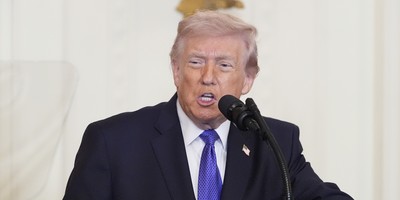BROOKLYN, N.Y. – The Brooklyn Bridge opened in 1883 at the height of America’s most turbulent political era.
Built with steel, adorned with electricity, this marvel of the future was rooted in our past – a pivotal moment in the Revolutionary War.
“What you do not see when you walk across the bridge is that you are overlooking where George Washington and his defeated army of the Battle of Brooklyn escaped in the middle of the night across the East River,” explained David McCullough, historian and author of The Great Bridge.
McCullough sees the bridge’s story – the creativity, work ethic and ingenuity that built it; the immigrants who worked on it; all of the backroom politics, corruption, tragedies and perseverance – as “emblematic of what makes America great.”
“The symbolisms are endless,” he said, down to the death of engineering designer John Augustus Roebling, his son Washington’s struggle to finish until he fell gravely ill, and Washington’s wife Emily stepping in as the “first woman field-engineer” to steer the project to completion.
Walking across the bridge’s pedestrian “boardwalk” on a frosty, rain-soaked December night doesn’t dim what one feels, staring up at what once were the Western Hemisphere’s tallest structures.
President Chester Arthur, a Republican, and New York Gov. Grover Cleveland, a Democrat, walked the span on opening day. Cleveland later became the 22nd and 24th president – winning, serving, losing, then winning again – during a period that saw four consecutive wave elections that switched congressional majorities by huge numbers.
It was dissatisfaction never before seen in the voting booth.
As with all of America, many cultural and political assumptions about Brooklyn aren’t necessarily true, said one man who was reluctant to give his name. (“I could lose my job,” he said with a Brooklyn accent only a native can deliver.)
Recommended
Born and raised here, he is a union secretary who made it in life without a college education, just sheer determination and hard work.
“People think ‘union,’ and all of a sudden they assume you want to beat up Republicans and organize a protest or go on strike,” he said.
“Well, you would be surprised how many Republicans I have personally voted for. And my guys’ work-ethic is the same as their fathers’ fathers.”
He described President Obama as “bitterly disappointing” to working people, and New Jersey Gov. Chris Christie as “an honest man who asked us for our ideas to make cuts easier” on unions when the Garden State’s budget had to be slashed.
He thinks the country is fine “because most of the people are good” but Washington “needs a bath.”
He thinks the “Occupy” protesters are “foolish, they do not represent working families.”
Marty Markowitz is Brooklyn’s borough president and all-around cheerleader for the borough and the bridge.
“We are the fourth largest city in America, if we were a separate city,” he said, “and we are catching up to Chicago.”
Colorful and exuberant, the former state senator said the bridge is symbolic of America: “The people that cross (it) … from hipsters to heads of families, are all seeking their version of the American dream.”
Markowitz, a Democrat, agrees with the union secretary that Washington is failing Brooklyn and the country. “That is why my borough voted Republican in the congressional special election this fall,” he said of the House seat once held by U.S. Senator Charles Schumer and vice presidential nominee Geraldine Ferraro, both Democrats.
He admitted that his Democrat-heavy borough swung the election to a Republican to replace disgraced congressman Anthony Weiner. “I disagree with their decision,” he said, “but, hey, I understand it.”
One week after the Brooklyn Bridge’s completion, a rumor spread that it was about to collapse, provoking a stampede that killed 12 people.
A hundred-plus years later, 200 Occupiers were arrested for using the bridge’s roadway – instead of its walkway – to stage a protest.
In between, thousands crossed it to escape lower Manhattan following the 9/11 terrorist attacks.
You cannot imagine – no one could – that this bridge would endure so many lifetimes, according to David McCullough.
Then again, who could have imagined that a ragtag army led by a Virginia gentleman-farmer could evacuate 8,000 men across the East River while the enemy slept?

























Join the conversation as a VIP Member